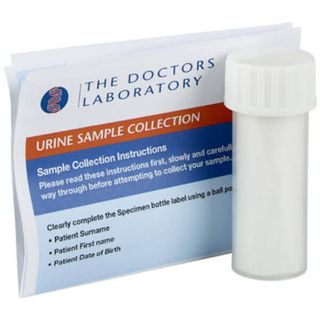
Chlamydia
Firstly, chlamydia is a really common sexually transmitted infection (STI) in the UK which you can catch through unprotected sex. Secondly, it’s nothing to be embarrassed about - lots of people are treated every year - but it is important to get tested if you think you have an infection because if left untreated it can lead to fertility problems. It’s easily treated with a short course of antibiotics such as doxycycline and azithromycin. We'll figure which one is best for you and get you sorted.
Chlamydia Treatments
 Doxycline - Antibiotics For Chlamydia£18.99
Doxycline - Antibiotics For Chlamydia£18.99
Azithromycin Tablets & Suspension
Azithromycin Tablets & Suspension£19.99
Chlamydia & Gonorrhoea Test Kit
Chlamydia & Gonorrhoea Test Kit£42.99
Start your assessment for Chlamydia
Don't wait to get the medical help you need.
Once you complete a short online assessment about your condition, you will be able to select your preferred treatment and quantity from a list of appropriate options for you.
- Reviewed by our UK-based medical team
- Takes less than 3 minutes to complete
- Approved treatments dispatched same day (before 3pm)
Ordering as easy as 1, 2, 3
1. Find the ideal treatment
2. Get a free consultation
3. Enjoy speedy delivery
Advice for Chlamydia
What is Chlamydia and what causes it?
Chlamydia is a sexually transmitted infection caused by the bacteria chlamydia trachomatis.
Chlamydia infections are very common, particularly among those under the age of 25. That said, chlamydial infections can be contracted at any age if you’re a sexually active person.
Chlamydia is commonly transmitted via sexual intercourse, namely semen and vaginal fluid during oral, anal, and vaginal sex. Note that it can be passed from one partner to another without ejaculation.
It can also be passed through sex toys that have not been cleaned after use or have not been replaced with a clean condom. This means the infection can be transmitted without penetration or ejaculation.
Genital chlamydia can be contracted in a variety of ways, including:
- Unprotected sex (this can be vaginal, anal or oral)
- Sharing sex toys that haven’t been washed between users
- Your genitals coming into contact with another person’s genitals
Chlamydia isn’t something that can be caught through casual contact. For instance, It’s unlikely you’ll contract the disease by holding hands or kissing, nor can it be transmitted by sharing household items like towels, baths or cutlery.
What are the symptoms of Chlamydia?
The majority of people with chlamydia don’t experience any symptoms at all.
Sometimes referred to as the silent infection, It’s estimated around 70% of women and around 50% of men don’t notice any symptoms despite carrying the Chlamydia infection.
When noticeable symptoms do develop, they will usually occur between one and three weeks after having unprotected sex with an infected person. The following symptoms differ for women and men:
Chlamydia Symptoms In Women:
- Pain during sexual intercourse
- Bleeding during and/or after sex
- Pain when urinating
- Bleeding between periods and heavier periods than normal
- Lower abdominal pain
- A noticeable change in any vaginal discharge
Chlamydia Symptoms In Men:
- An abnormal discharge from the tip of the penis.
- Burning sensation when urinating
- Pain in the testicles
- Pain in the lower abdomen
However, many men and women infected with chlamydia are asymptomatic, making it easier to pass on to another person. If you think you’ve had unprotected sexual contact with someone who might have chlamydia, get tested for the infection with a trusted health provider.
How is Chlamydia diagnosed?
Whether you are experiencing the symptoms or not, the only way to know for sure is to get tested. Fortunately, it’s relatively simple to diagnose chlamydia. After all, the available methods of testing are quick and painless.
You can buy chlamydia testing kits and medicine subject to our online consultation for STIs here at The Independent Pharmacy. We offer a speedy and reliable service to give you the medical advice you require.
Order chlamydia testing kits and medication and receive fast delivery, including discreet packaging, without having to step into your local pharmacy. Simply fill out your medical questionnaire and a medical professional will assess your order to ensure it is safe and effective for you, before shipping it out to your home.
Your GP or nurse can also provide a free chlamydia test. For most people, a test is carried out using a simple urine sample. This sample is then sent away for analysis. Another test will use a swab to collect a sample of contaminated cells. This involves gently wiping the swab over the area suspected to be infected with chlamydia. The swab will then be sent away for analysis.
If you have tested positive for chlamydia your sexual partner must be also treated at the same time to avoid re-infection. If you have had unprotected sex with someone who has tested positive for chlamydia it is not necessary to get a test if you do not wish to do so. If you have been positively tested for chlamydia or have had unprotected sex with a partner who has, you can buy chlamydia treatment directly from our Online Pharmacy.
For sexually active adults under the age of 25, it is recommended to get tested every year or every time you have a new sexual partner. The National Chlamydia Screening Programme can offer testing in an array of places close and convenient to you or you can purchase a home chlamydia test from our Online Pharmacy.
If you test positive for chlamydia, it is advised that you contact any sexual partners you’ve had within the past six months. This will ensure they can be checked and receive treatment if necessary. Sexual health clinics are readily available and are willing to contact these partners on your behalf if you wish. Everything is handled confidentially and your name will not appear on any of the correspondence.
The recommended criteria for getting tested for chlamydia include the following:
- You or your partner are suffering from any of the symptoms of chlamydia
- You’ve had unprotected sex with a new partner or a condom has split during protected sex
- You or your partner have had unprotected sex with others
- You or your partner suspect having a sexually transmitted disease (STI)
- During a vaginal examination, if your GP or nurse notices any inflammation or vaginal discharge
- You’re either pregnant or planning on becoming pregnant
If you suspect or are experiencing any symptoms of chlamydia, it’s very important to get tested. If left untreated it could potentially spread and create further complications. In women, it can spread into the womb and cause pelvic inflammatory disease (PID). PID is a major cause of miscarriage, ectopic pregnancy and infertility.
What Chlamydia treatment is available?
Fortunately treating chlamydia is quick and easy. It involves a short course of antibiotics.
The two most commonly prescribed chlamydia treatments are Azithromycin and Doxycycline. They are an effective treatment for chlamydia, and if taken correctly cure more than 95 out of every 100 cases of chlamydia.
About Doxycycline
Doxycycline is the currently recommended first-line antibiotic to treat chlamydia by the UK health body the National Institute for Health and Care Excellence (NICE).
Doxycycline is a longer course treatment and will involve taking two capsules every day for one week. However, it currently has a lower chance of bacterial resistance than azithromycin meaning treatment is more likely to be effective.
If complications are suspected then a longer course of antibiotics may be necessary. Ensure you follow the treatment guidelines set out on medication to treat chlamydia. If treatment is taken incorrectly then it could be ineffective.
About Azithromycin
If doxycycline isn’t appropriate, usually because of an allergy, then azithromycin will become the preferred antibiotic. Azithromycin is taken as a single-dose treatment of two tablets. Both tablets are swallowed at once with a glass of water on an empty stomach. It needs to be taken either an hour before food or two hours after food for maximum effectiveness.
Buying chlamydia treatment
You can purchase chlamydia treatment online from The Independent Pharmacy if you meet one of the following criteria:
- You have already had a positive test result for chlamydia
- There is a high chance you have chlamydia and you cannot wait for a test result
- A sexual partner has tested positive for chlamydia
- You have had a chlamydia test from The Independent Pharmacy that has returned positive
You should refrain from having sex for at least one week after completing your course of chlamydia treatment antibiotics.
If your sexual partner hasn’t undergone any treatment, it would be advised not to have sex with them until they have been tested or have taken the appropriate antibiotics.
It is advised to always avoid having sex until all the related symptoms have gone completely (for 7 days as a minimum).
How long will the antibiotics take to work?
Chlamydia antibiotics, Azithromycin or Doxycycline, usually clear symptoms quickly. Pain on passing urine and discharge normally clear within a week.
However pelvic pain or testicular pain can take two weeks to pass. Menstrual irregularities should improve by the next cycle.
Any symptoms that persist may be an indicator of failed treatment. If this occurs then you should see your doctor or local sexual health clinic for further treatment.
If the course of chlamydia treatment is taken correctly then there will be no need for re-testing to check the chlamydia has gone. A follow-up test is only advised if any of the following applies:
- You didn’t take the medication as instructed
- Your symptoms remain
- Your symptoms have come back
- You had sex before you and your partner had completed treatment
There are many reasons why you may be experiencing persistent symptoms. For example, due to antibiotic resistance, sexually transmitted diseases like chlamydia are becoming more difficult to treat.
Here are some other reasons why your chlamydia symptoms might not be clearing up :
- You have another underlying sexually transmitted infection (STI) at the same time. This will need further investigations or tests. Gonorrhoea commonly occurs in conjunction with chlamydia.
- You have an unrelated infection e.g. a lower urinary tract infection or endometriosis.
- On rare occasions, the strain of bacteria can be resistant to the antibiotics and further treatment is required. Another chlamydia test may be required but this will have to be performed after 6 weeks. Any earlier and the test will present a positive result from the initial infection.
In the case of failed treatment or unresolved symptoms, you should see your GP or visit your local GUM clinic.
Can Chlamydia be left untreated?
Chlamydia does not go away on its own and should not be left untreated. Why? Because not getting treated leaves you open to a myriad of risk factors.
Men who don’t get treated risk several complications, including swollen testicles (orchitis), reactive arthritis, and infertility.
Chlamydia may also cause problems with the reproductive system. For example, women who go without treatment run the risk of infection spreading to the uterus and fallopian tubes, resulting in pelvic inflammatory disease and even infertility.
Moreover, the infection in pregnant women can pass to the child during delivery via the birth canal. It can cause pneumonia, eye infections, preterm labour and low birth weight.
Chlamydia screening and treatment for chlamydia during pregnancy can prevent these complications. This is not part of the routine NHS antenatal screening but your midwife or GP can arrange a simple swab test.
Common antibiotic treatments like doxycycline cannot be taken during pregnancy, but azithromycin is safe and effective. If you think you have chlamydia and you are pregnant, you should see your doctor for treatment.
How can I prevent myself from getting Chlamydia (and other sexually transmitted infections)?
There are measures you can take which will help guard against chlamydia and other sexually transmitted diseases.
These include:
- Using a condom during penetrative sex — this applies to both vaginal and anal intercourse
- During oral sex use a condom to cover the penis
- If using sex toys, don’t share them with others without first washing the toy or covering it with a fresh condom
- If performing oral sex on the female genitals, or when rubbing female genitals together, make use of a device called a dental dam — a dental dam is a thin piece of latex or plastic used to cover the female genitals
FAQs for Chlamydia
Is Chlamydia the same as 'The Clap'?
No, although it is commonly thought that chlamydia is 'the clap', it is gonorrhoea that 'the clap' refers to. Gonorrhoea tests are also available from The Independent Pharmacy.
I have taken Chlamydia treatment but why have my symptoms have not cleared up yet?
There are many reasons why you may be experiencing persistent symptoms. These could include:
- You have another underlying sexually transmitted infection (STI) at the same time. This will need further investigations or tests. Gonorrhoea commonly occurs in conjunction with chlamydia.
- You have an unrelated infection e.g. a lower urinary tract infection or endometriosis.
- On rare occasions, the strain of bacteria can be resistant to the antibiotics and further treatment is required. Another chlamydia test may be required but this will have to be performed after 6 weeks. Any earlier and the test will present a positive result from the initial infection.
In the case of failed treatment or unresolved symptoms, you should see your GP or visit your local GUM clinic.
Do I have to tell my partner or previous sexual partners?
You must tell your current partner and other sexual partners within the last six months if you have been tested positive for chlamydia because:
- They may not know they have an infection and can spread it to others.
- If it is left untreated it can lead to serious complications such as infertility.
- Chlamydia treatment is easy, simple and the infection is curable.
We understand that this may be a difficult conversation, however, you must tell your previous sexual partners if you have been diagnosed with chlamydia to allow them to be tested and treated.
After taking Chlamydia treatment how long will it take for my symptoms to clear?
Chlamydia antibiotics, Azithromycin or Doxycycline, usually clear symptoms quickly. Pain on passing urine and discharge normally clear within a week,
however pelvic or testicular pain can take two weeks to pass. Menstrual irregularities should improve by the next cycle. Any symptoms that persist may be an indicator of failed treatment, if this occurs you should see your doctor or local sexual health clinic for further treatment.Is it best for both partners to get Chlamydia treatment at the same time?
Yes, it is important to treat both sexual partners for chlamydia if they have had sex because one partner untreated or partially treated can re-infect the other. After treatment, you need to abstain from sexual activity for one week. This includes genital, oral and anal sex even with a condom.
How do I protect myself from getting Chlamydia again in the future?
Use a barrier method, such as a condom, to protect yourself from sexually transmitted diseases.
Clean sex toys before using them again or replace the condom and them for each new sexual activity.
At the start of a new sexual relationship, both partners should be tested for STIs (and treated if necessary) before sexual contact.
What do I do if a sexual partner tells me they have Chlamydia?
You may wish to go ahead and get chlamydia treatment without being tested if you have had unprotected sex with someone who has chlamydia.
You can also get a chlamydia test to see if you have a positive result. If you do get a positive result, you will need to take antibiotic treatment to cure your chlamydia infection, this is normally very straightforward.
If you have had sex with other partners since you were infected, you need to contact them to let them know that they should take a Chlamydia test and may require treatment.
What if I take a Chlamydia test and it is negative, should I get treatment anyway?
If you take a chlamydia test and you get a negative result, you may wish to take chlamydia treatment — though, not everyone that comes into contact with chlamydia will become infected.
However, there is also a chance of a false-negative test, meaning you may wish to have chlamydia treatment anyway for peace of mind.
Is it safe to buy Chlamydia treatment online?
Yes, as long as you are buying from a website that is a legally operating and regulated pharmacy it is perfectly safe to buy chlamydia antibiotic treatment online.
The Independent Pharmacy is an NHS Online Pharmacy based in Bristol and has all the necessary regulations to be able to safely provide convenient access to genuine prescription antibiotics through our online pharmacy.
How do I buy antibiotic treatment for Chlamydia online?
It's simple! All you will need to do is fill in a simple health questionnaire so we can ensure that chlamydia treatment will be safe and effective for you. It all takes less than five minutes and they can be delivered to your door.
Is it possible to have chlamydia for years and not know?
Because chlamydia doesn’t exhibit many symptoms, spotting the signs of this infection can be tricky. Many people have contracted this STD without knowing and it’s left untreated. There can be tricky complications for those that do not treat chlamydia early enough.